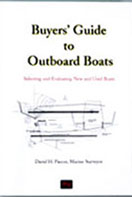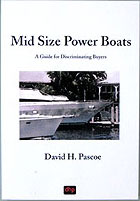Chapter 11
Excerpt
Now that there are so many boat builders that are selling boats pre rigged at the factory, many of the problems we've had in the past with bad installations made by dealers has been greatly reduced, if not eliminated. Even so, I still recommend that you check over the installation carefully.
While this chapter applies primarily to new boats, it can also be used as a guide for evaluating engine installation on used boats.
Horsepower Ratings
By law, boat builders are required to affix to their boats a rating decal which indicates the maximum horsepower the boat is designed to handle. Exceeding this limit will probably void the warranty and may lead to hull or transom failure. (Fig. 11-1)
Steering Systems
It is important to have a good quality steering system simply because the system needs to be strong and durable enough to turn the heavy motors that steer the boat.
The helm, or steering wheel, is also the thing you hang onto while the boat is bashing into the waves.
With small runabouts, you will likely have no choice of steering systems and have to take whatever the boat is rigged with.
Thus you may end up rejecting a boat based solely on the fact that you don't like the steering. One option would be to have the dealer install a better system at additional cost.
Otherwise, you have to live with something you don't like. A steering system also needs to be highly corrosion resistant because it is always getting wet. They come in two basic types, mechanical and hydraulic.
Mechanical systems utilize a simple rack and pinion operating a push-pull cable inside a plastic coated, steel jacketed sleeve.
The obvious weakness of these systems is that word "steel," which means that the cable can rust and seize up.
I don't recommend these systems for saltwater use, but they're generally okay for smaller boats in fresh water. These systems are rarely found anymore. This type is most often found on small runabouts.
Hydraulic systems are by far the best type to have, although there are numerous manufacturers putting out a wide range of differing quality systems.
Teleflex, for example makes systems ranging from very good to poor. Hynautic has an excellent reputation for making high quality systems that are basically the industry standard for larger boats. Sea Star, Wagner, Capillano are other makers of good quality systems. Hynautic is generally regarded as the best, and it's the one I'd recommend for outboards.
In some cases you will be able to choose your steering system, and it is recommended that you choose a top of the line system.
You should get a brochure from the manufacturer you have selected. This info is usually available on the Internet, at boat shows or from parts dealers.
Pay attention to the number of turns that the wheel will take "lock-to-lock." I recommend not more than three full turns, meaning 1-1/2 turns of the wheel in each direction.
(Additional spaces are added for easy screen reading.)
Table of Contents: Chapter 11
Horsepower
Ratings
Steering Systems
Engine Controls
Fuel Filters
Fuel Tank Vents
Engine Installation
Pre-delivery Test Run
Add-on Items
Selecting and Installing Electronics
Bilge Pumps
Dealing With Problems
Necessary Extra Equipment
 Buyers' Guide to Outboard Boats
Buyers' Guide to Outboard Boats - Selecting and Evaluating New and Used Boats
by David H. Pascoe
Soft Cover
272 pages
Publisher: D. H. Pascoe & Co., Inc.
Published: 2002
Language: English
ISBN-10: 0965649628
ISBN-13: 9780965649629
In Stock
HOME >
David Pascoe - Biography
David Pascoe is a second generation marine surveyor in his family who began his surveying career at age 16 as an apprentice in 1965 as the era of wooden boats was drawing to a close.
Certified by the National Association of Marine Surveyors in 1972, he has conducted over 5,000 pre purchase surveys in addition to having conducted hundreds of boating accident investigations, including fires, sinkings, hull failures and machinery failure analysis.
Over forty years of knowledge and experience are brought to bear in following books. David Pascoe is the author of:
- "Mid Size Power Boats" (2003)
- "Buyers’ Guide to Outboard Boats" (2002)
- "Surveying Fiberglass Power Boats" (2001, 2nd Edition - 2005)
- "Marine Investigations" (2004).
In addition to readers in the United States, boaters and boat industry professionals worldwide from over 70 countries have purchased David Pascoe's books, since introduction of his first book in 2001.
In 2012, David Pascoe has retired from marine surveying business at age 65.
On November 23rd, 2018, David Pascoe has passed away at age 71.




Normally orders ship the same day, if placed before 12:00 PM Eastern time.